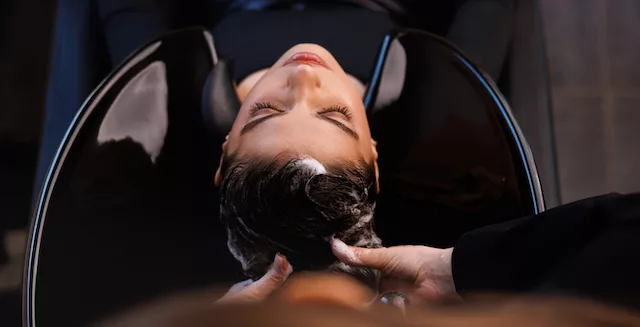Time for some scalp TLC? Come winter, the weather outside can be notoriously frightful—and so, too, can be a dry and flaky scalp. While itching, inflammation, and flakes aren’t limited to winter alone, seasonal factors tend to instigate dips in scalp and hair health… though they surely don’t have to.
Ahead, discover the ins and outs of getting rid of dry scalp in winter and beyond, according to a dermatologist and a scalp specialist.
What Causes Dry Scalp in Winter?
A perfect storm of conditions can trigger your otherwise balanced scalp to get dry and flaky once temperatures drop by year’s end.


“During the winter, there is usually a significant drop in relative humidity,” explains Mayara Macedo, hairstylist and scalp specialist at The Second Floor Salon in NYC. “Combined with heating systems that dry out the air, this creates harsher conditions that leave the scalp and hair more prone to dryness and irritation.”
Nazanin Saedi, MD, a board-certified dermatologist and clinical associate professor at Thomas Jefferson University in Philadelphia, notes that there are a few additional reasons why your scalp could get dry—no matter if it’s during the winter or any other time of year. These include:
- Buildup of natural oils and hair products
- Sensitive or irritated skin
- Overgrowth of Malassezia globosa (a fungus that helps break down sebum on your scalp, which in the process produces oleic acid that many people are sensitive to)
“Lastly, our skin tends to get drier as we age,” Dr. Saedi shares. Dryer skin often means a dryer scalp, which will require modifying your current hair and scalp care routine.
Dry Scalp vs. Dandruff
While you may think that dandruff and dry scalp are one and the same, they’re not interchangeable. Dry scalp is typically triggered by a lack of moisture (i.e., dry skin), whereas dandruff is caused by excessive sebum production and yeast overgrowth on the scalp.
“Dandruff is more likely the culprit of your dry, flaky scalp if your flakes are paired with a consistently oily scalp,” Dr. Saedi explains. (Note: Flakes from dry scalp tend to be small and white. On the other hand, dandruff flakes are large, yellow, and coated with oily residue.) “Dandruff is completely normal and is typically easily treated and managed with an anti-dandruff shampoo,” she assures us.
9 Tips to Get Rid of Dry Scalp
If you’re dealing with dry scalp and are determined to fix it, follow the expert-approved tips below to quench your strands through winter and beyond.
1. Wash Your Hair Less in the Winter
“To adapt your routine, wash your hair less frequently in the winter to preserve natural oils,” Macedo advises. Depending on your hair condition, 2 to 3 washes per week should suffice during the colder months. Conversely, she says that you may need to switch this up during the summer, washing up to 3 to 4 times a week to thoroughly cleanse sweat and product buildup.
Dr. Saedi says that you’ll need to vary your number of wash days depending on your specific condition, so pay close attention to your individualized needs to maintain a balanced scalp. “Dry skin can be a sign that you are over-washing or under-washing your hair. Stripping your hair and scalp of its natural oils too often can dry it out,” she explains. “Conversely, not washing it enough can cause oil to build up and irritate the scalp.”
TL;DR: The more oily your hair and scalp are, the more you’ll need to wash it and vice versa.
2. Choose the Right Winter Hair Care Products
During winter, Macedo recommends prioritizing the likes of:
- Moisturizing shampoos and conditioners
- Scalp oils
- Leave-in treatments with nourishing ingredients like argan oil and shea butter
She also suggests incorporating cleansing clay masks into your regimen to replenish essential minerals and improve scalp health.
Note: If your scalp is suddenly dry out of nowhere, a new product in your arsenal could be the culprit, says Dr. Saedi. As such, it’s always wise to integrate one new item at a time to see if it’s working well or not. If you’re convinced a new product is triggering a reaction like dryness, the derm advises ceasing use and waiting to see if your scalp recovers.
3. Avoid Hot Showers
As tempting as it may be to warm yourself from head to toe in a steaming hot shower, doing so will likely lead to a dry scalp, hair, and skin, Macedo warns. A 2022 study in the Journal of Clinical Medicine also found that long and continuous water exposure—especially at higher temperatures—damages skin barrier function.
As such, aim to take relatively short, lukewarm showers in the wintertime, especially on your hair-washing days.
4. Get Your Post-Wash Routine in Order
Getting rid of dry scalp to boost balance and overall hair health will also require some effort after washing.
Per Macedo, you’ll want to:
- Avoid sleeping with wet hair
- Keep heat tool usage to a minimum
- Use hair repair oil more frequently during winter to combat dryness
- Apply hair oil or serum on the tips of your strands to lock in hydration
- Sleep on a silk pillowcase to reduce friction and static
5. Indulge in Scalp Massages
Scalp massages don’t only feel great; they can also play a part in getting rid of a dry scalp and flakes. “A scalp massage can help loosen and clear dry skin, product buildup, and excess oil from the scalp,” Dr. Saedi shares. “It will also help stimulate blood circulation which can be helpful for hair growth.”


In addition, scalp massages have the potential to:
- Improve hair thickness
- Combat dandruff
- Stave off hair loss
- Reduce stress
You can choose to take the DIY route by massaging your scalp for about 5 minutes (whether your hair is dry or while shampooing), visiting a scalp spa, or investing in tools. Both pros recommend the GrandeHAIR Stimulating Scalp Massager for total hair and scalp health.
6. Be Mindful of Hat-Wearing
Personally, I can’t resist the coziness and warmth of a beanie in the winter (or the casual vibes of a baseball cap year round). However, those who are dealing with a dry scalp and irritation need to be more cautious about how often they wear these toppers.
While you can rest assured that hats don’t cause hair loss, they may trigger inflammation and rashes by harboring sweat and debris. “Minimize wearing hats for extended periods, as they can trap moisture and create irritation,” Macedo advises. In short, aim to wear them when you need them most—i.e., braving cold temps outdoors—but taking them off once you’re safely indoors and/or working out.
7. Visit a Professional for More Intensive Scalp Treatments
To completely get rid of dry scalp, you’ll want to visit a professional for a personalized diagnosis and plan. For instance, Macedo notes that high-frequency treatments can effectively rehabilitate your scalp and strands by boosting circulation.
8. Invest in a Humidifier
“If your dry scalp is instigated by drier, cooler weather, a humidifier can certainly help,” says Dr. Saedi. The same goes if you struggle with dry skin—whether chronic or due to dry winter air and heating system—thanks to the added moisture these devices provide.
9. Adhere to a Hair- and Scalp-Friendly Diet
Last but not least, your dietary intake has the potential to help or hinder your hair and scalp health. Per a 2022 review, the right nutrients can “counter oxidative stress, repair cellular damage, support cellular functions, and restore hair growth.”
As we’ve previously covered in our dietary guide to hair growth, standout nutrients include but aren’t limited to:
In addition to following a healthy, diverse diet rich in whole foods, you may also want to level up your routine with supplements, such as:
- Hair Strong Gummies, which provides biotin for overall hair health, zinc to nourish hair follicles, and Fo-Ti for hair growth and healthy color
- Daily Cleanse, which detoxes and skin and scalp from the inside out courtesy of antioxidants, minerals, and green superfoods
Dry Scalp FAQs
Why is it essential to have a scalp and hair care routine that caters to winter vs. summer?
Different environmental conditions require different protocols to promote healthy hair and skin. Since winter is colder and drier than summer, hydration and nourishment are paramount. “Winter care should include deep hydration and protective, soothing [products], while summer hair care benefits from UV-protective sprays to guard against sun exposure,” Macedo explains.
You should also wash your hair less in the winter (2 to 3 times per week, on average) and more in summer (3 to 4 times) for optimal balance.
1. How long does it take to get rid of dry scalp?
You’ll need to make a concerted effort to remedy dry scalp, such as by using clay masks, essential oils, scalp serums, as well as employing the lifestyle hacks shared above. “Combining these treatments at home or at the salon can typically [yield] improvement within 4 weeks with 2 sessions per week,” says Macedo.
2. What are the best natural oils for a dry scalp?
Natural oils that can nourish a dry scalp include:
- Jojoba oil, as it mimics the skin’s natural sebum and can help combat dandruff
- Argan oil, which offers moisture and can help regulate sebum production
- Coconut oil, which is best for fine-to-medium textured hair
- Rosemary oil, which Dr. Saedi notes is great for hydration
3. Can diet affect scalp dryness?
While Dr. Saedi says that more research is needed to uncover the connection between diet and scalp dryness, some research suggests associations with certain foods.
For instance, a 2022 Cureus study found the following foods were associated with exacerbating seborrheic dermatitis (i.e., itchy, scaly rashes primarily on the scalp):
- Spicy food
- Sweets
- Fried food
- Dairy
On the other hand, citrus fruits, leafy greens, and other veggies were associated with improving the condition.
In short, alongside other contributing factors (e.g., age, health status, climate, lifestyle), diet is likely to affect the health of your scalp and hair for better or for worse—hence underscoring the importance of a nutrient-rich, diverse diet.
4. How often should I exfoliate my scalp?
Macedo says that exfoliating your scalp isn’t always necessary. However, it can certainly help those under specific conditions—namely if your scalp is oily and dead skin (i.e., those pesky flakes) accumulates.
How often you should exfoliate your scalp varies based on your hair type, lifestyle, and climate. “For normal or combination scalps, exfoliate every 1 to 2 weeks. Oily scalps benefit from weekly exfoliation to prevent buildup and regulate oil production, using products with acidic ingredients,” she explains. “Dry or sensitive scalps should be exfoliated every 2 to 3 weeks with gentle, calming products, like those containing lavender.”
Remember: Manual scalp massages, tools, detoxifying treatments, and scrubs all count towards your exfoliating quota.




